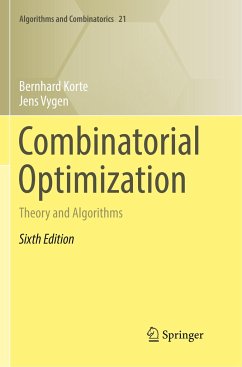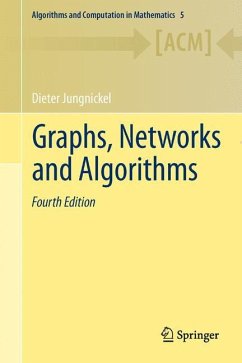Versandkostenfrei!
Versandfertig in 1-2 Wochen

PAYBACK Punkte
54 °P sammeln!





This book offers an in-depth overview of polyhedral methods and efficient algorithms in combinatorial optimization.These methods form a broad, coherent and powerful kernel in combinatorial optimization, with strong links to discrete mathematics, mathematical programming and computer science. In eight parts, various areas are treated, each starting with an elementary introduction to the area, with short, elegant proofs of the principal results, and each evolving to the more advanced methods and results, with full proofs of some of the deepest theorems in the area. Over 4000 references to furthe...
This book offers an in-depth overview of polyhedral methods and efficient algorithms in combinatorial optimization.These methods form a broad, coherent and powerful kernel in combinatorial optimization, with strong links to discrete mathematics, mathematical programming and computer science. In eight parts, various areas are treated, each starting with an elementary introduction to the area, with short, elegant proofs of the principal results, and each evolving to the more advanced methods and results, with full proofs of some of the deepest theorems in the area. Over 4000 references to further research are given, and historical surveys on the basic subjects are presented.
Alexander Schrijver is one of the most respected researchers in this area. He has won the Dantzig award, the Fulkerson prize (twice) and the Lanchester Prize for his earlier classic text on "Theory of Linear and Integer Programming".
Produktdetails
- Algorithms and Combinatorics 24
- Verlag: Springer / Springer Berlin Heidelberg / Springer, Berlin
- Artikelnr. des Verlages: 10874786, 978-3-540-44389-6
- 2003
- Seitenzahl: 1992
- Erscheinungstermin: 10. Dezember 2002
- Englisch
- Abmessung: 241mm x 160mm x 123mm
- Gewicht: 3550g
- ISBN-13: 9783540443896
- ISBN-10: 3540443894
- Artikelnr.: 11161180
Herstellerkennzeichnung
Springer-Verlag GmbH
Tiergartenstr. 17
69121 Heidelberg
ProductSafety@springernature.com
"What a book! Actually it is three books which come very nicely in a yellow box! On 1882 (!) pages - and even the inside back cover of the book is efficiently used for notation and terminology - Lex Schrijver informs the reader about the absolute state-of-the-art and in-depth knowledge on polyhedral combinatorics - the most important and powerful tool throughout combinatorial optimization - and efficient algorithms. [...] About 30 years ago, when I was a student, the first book on combinatorial optimization came out refered to as 'the Lawlwer' simply. I think that now, with this volume Springer has landed a coup: 'The Schrijver'. The box is offered for less than 90,- EURO which to my opinion is one of the best deals after the introduction
Mehr anzeigen
of this currency."
-- Ulrich Derigs (Köln) OR-Spectrum 2004, Issue 21, p.47
"chrijver's 3 volumes on combinatorial optimization reflect the current state of the art in this field, in particular from the viewpoint of polyhedral combinatorics and efficient algorithms. [...] The book offers a masterly introduction with many interesting historical remarks as well as an in-depth survey of combinatorial optimization. It is divided into eight main parts with 83 chapters. The main parts are (I) paths and flows, (II) bipartite matching and covering, (III) nonbipartite matching and covering, (IV) matroids and submodular functions, (V) trees, branchings and connectors, (VI) cliques, stable sets and colouring, (VII) multiflows and disjoint paths and, finally, (VIII) hypergraphs.[...] The reader is supposed to have a basic knowledge of graph theory and linear as well as integer programming. The author gives short and elegant proofs to all main results. [...]These three volumes contain an immense richness of results up to 2002 and will prove to be indispensible for any further research in the field of combinatorial optimization."
-- Rainer E. Burkard (Graz) Zentralblatt Math Database, 2003.
"[..] Now comes Schrijver's book, a current and extremely comprehensive account, running 1,451 pages; by itself the bibliography would make a long book. But even as the book provides reference material to satisfy the experts, strong undergraduates will profit by dipping straight into nearly any chapter. Mathematics and computer science students should consult it, both to supplement their theoretical coursework or to find algorithms for practical projects. Summing Up: All three books: Recommended. Upper-division undergraduates through faculty."
-- American Library Association, 2003.
"[ ] To the knowledge of this reviewer this work comes as close as one can hope to an encyclopaedic reference in this field. The three volumes span almost 1990 pages and the price is quite low given the size of the work. The acquisition of it constitutes one of the most valuable investments for any researcher in this field.
...[ ]
Conclusions: The main qualities of this work should now be apparent: completeness and coherence, obviously confined to the goal established by the Author. There are about 1400 pages of text, where Schrijver confirms his gifts for a lucid and concise style. The more than 4000 references take another 300 pages. This work is a wonderful tool for researchers active in CO and an invaluable one for doctoral students trying to orient themselves in this area. It illustrates elegant and important results in PC which are both essential for the understanding of CO research today as well as making a convincing case for the key role of Discrete Mathematics in this field. Finally it describes most algorithms with precision constituting an invaluable reference for computer scientists interested inthe development of efficient algorithms for CO problems. Therefore, the principal role of this work is that of an essential reference for research work of mathematicians, computer scientists, operational researchers. But it is also more than that, because each topic is presented in a coherent and concise style, making this book the best 'door' for entering any of the fields considered. I will not repeat myself speaking again of the excellent entertainment that the historical parts can provide. Given all this, the price of 90 euros is indeed a very reasonable one and Springer must be complimented for having made possible for each researcher to acquire this outstanding tool. Lex Schrijver also received some years back the Dantzig Prize for the impact of this work and its previous one; the citation of that prize ends with the following sentence: 'Characterized by insights that are both broad and deep, and by a continual pursuit of simplification and unity, Schrivers's work is scholarship at its best.' I think the scientific community must be really grateful to Lex and convey to him a choral 'thank you!'"
--
Francesco Maffioli, European Journal of Operations Research
-- Ulrich Derigs (Köln) OR-Spectrum 2004, Issue 21, p.47
"chrijver's 3 volumes on combinatorial optimization reflect the current state of the art in this field, in particular from the viewpoint of polyhedral combinatorics and efficient algorithms. [...] The book offers a masterly introduction with many interesting historical remarks as well as an in-depth survey of combinatorial optimization. It is divided into eight main parts with 83 chapters. The main parts are (I) paths and flows, (II) bipartite matching and covering, (III) nonbipartite matching and covering, (IV) matroids and submodular functions, (V) trees, branchings and connectors, (VI) cliques, stable sets and colouring, (VII) multiflows and disjoint paths and, finally, (VIII) hypergraphs.[...] The reader is supposed to have a basic knowledge of graph theory and linear as well as integer programming. The author gives short and elegant proofs to all main results. [...]These three volumes contain an immense richness of results up to 2002 and will prove to be indispensible for any further research in the field of combinatorial optimization."
-- Rainer E. Burkard (Graz) Zentralblatt Math Database, 2003.
"[..] Now comes Schrijver's book, a current and extremely comprehensive account, running 1,451 pages; by itself the bibliography would make a long book. But even as the book provides reference material to satisfy the experts, strong undergraduates will profit by dipping straight into nearly any chapter. Mathematics and computer science students should consult it, both to supplement their theoretical coursework or to find algorithms for practical projects. Summing Up: All three books: Recommended. Upper-division undergraduates through faculty."
-- American Library Association, 2003.
"[ ] To the knowledge of this reviewer this work comes as close as one can hope to an encyclopaedic reference in this field. The three volumes span almost 1990 pages and the price is quite low given the size of the work. The acquisition of it constitutes one of the most valuable investments for any researcher in this field.
...[ ]
Conclusions: The main qualities of this work should now be apparent: completeness and coherence, obviously confined to the goal established by the Author. There are about 1400 pages of text, where Schrijver confirms his gifts for a lucid and concise style. The more than 4000 references take another 300 pages. This work is a wonderful tool for researchers active in CO and an invaluable one for doctoral students trying to orient themselves in this area. It illustrates elegant and important results in PC which are both essential for the understanding of CO research today as well as making a convincing case for the key role of Discrete Mathematics in this field. Finally it describes most algorithms with precision constituting an invaluable reference for computer scientists interested inthe development of efficient algorithms for CO problems. Therefore, the principal role of this work is that of an essential reference for research work of mathematicians, computer scientists, operational researchers. But it is also more than that, because each topic is presented in a coherent and concise style, making this book the best 'door' for entering any of the fields considered. I will not repeat myself speaking again of the excellent entertainment that the historical parts can provide. Given all this, the price of 90 euros is indeed a very reasonable one and Springer must be complimented for having made possible for each researcher to acquire this outstanding tool. Lex Schrijver also received some years back the Dantzig Prize for the impact of this work and its previous one; the citation of that prize ends with the following sentence: 'Characterized by insights that are both broad and deep, and by a continual pursuit of simplification and unity, Schrivers's work is scholarship at its best.' I think the scientific community must be really grateful to Lex and convey to him a choral 'thank you!'"
--
Francesco Maffioli, European Journal of Operations Research
Schließen
From the reviews of the book version:
Schrijver's 3 volumes on combinatorial optimization reflect the current state of the art in this field, in particular from the viewpoint of polyhedral combinatorics and efficient algorithms. [...] The book offers a masterly introduction with many interesting historical remarks as well as an in-depth survey of combinatorial optimization. It is divided into eight main parts with 83 chapters. The main parts are (I) paths and flows, (II) bipartite matching and covering, (III) nonbipartite matching and covering, (IV) matroids and submodular functions, (V) trees, branchings and connectors, (VI) cliques, stable sets and colouring, (VII) multiflows and disjoint paths and, finally, (VIII)
Schrijver's 3 volumes on combinatorial optimization reflect the current state of the art in this field, in particular from the viewpoint of polyhedral combinatorics and efficient algorithms. [...] The book offers a masterly introduction with many interesting historical remarks as well as an in-depth survey of combinatorial optimization. It is divided into eight main parts with 83 chapters. The main parts are (I) paths and flows, (II) bipartite matching and covering, (III) nonbipartite matching and covering, (IV) matroids and submodular functions, (V) trees, branchings and connectors, (VI) cliques, stable sets and colouring, (VII) multiflows and disjoint paths and, finally, (VIII)
Mehr anzeigen
hypergraphs.[...] The reader is supposed to have a basic knowledge of graph theory and linear as well as integer programming. The author gives short and elegant proofs to all main results. [...]These three volumes contain an immense richness of results up to 2002 and will prove to be indispensible for any further research in the field of combinatorial optimization.
Rainer E. Burkard (Graz) Zentralblatt Math Database, 2003.
[..] Now comes Schrijver's book, a current and extremely comprehensive account, running 1,451 pages; by itself the bibliography would make a long book. But even as the book provides reference material to satisfy the experts, strong undergraduates will profit by dipping straight into nearly any chapter. Mathematics and computer science students should consult it, both to supplement their theoretical coursework or to find algorithms for practical projects. Summing Up: All three books: Recommended. Upper-division undergraduates through faculty.
American Library Association, 2003.
[ ] To the knowledge of this reviewer this work comes as close as one can hope to an encyclopaedic reference in this field. The three volumes span almost 1990 pages and the priceis quite low given the size of the work. The acquisition of it constitutes one of the most valuable investments for any researcher in this field.
...[ ]
Conclusions: The main qualities of this work should now be apparent: completeness and coherence, obviously confined to the goal established by the Author. There are about 1400 pages of text, where Schrijver confirms his gifts for a lucid and concise style. The more than 4000 references take another 300 pages. This work is a wonderful tool for researchers active in CO and an invaluable one for doctoral students trying to orient themselves in this area. It illustrates elegant and important results in PC which are both essential for the understanding of CO research today as well as making a convincing case for the key role of Discrete Mathematics in this field. Finally it describes most algorithms with precision constituting an invaluable reference for computer scientists interested inthe development of efficient algorithms for CO problems. Therefore, the principal role of this work is that of an essential reference for research work of mathematicians, computer scientists, operational researchers. But it is also more than that, because each topic is presented in a coherent and concise style, making this book the best "door" for entering any of the fields considered. I will not repeat myself speaking again of the excellent entertainment that the historical parts can provide. Given all this, the price of 90 euros is indeed a very reasonable one and Springer must be complimented for having made possible for each researcher to acquire this outstanding tool. Lex Schrijver also received some years back the Dantzig Prize for the impact of this work and its previous one; the citation of that prize ends with the following sentence: "Characterized by insights that are both broad and deep, and by a continual pursuit of simplification and unity, Schrivers's work is scholarship at its best." I think the scientificcommunity must be really grateful to Lex and convey to him a choral "thank you!"
Francesco Maffioli, European Journal of Operations Research
"As the author states in the preface, it is his aim to offer 'both an introduction to and an in-depth survey of polyhedral combinatorics and efficient algorithms'. This is not at all an easy task ... . But he succeeds very well, and the result of his efforts is a voluminous treatise split into three volumes. The material is organized into eight parts ... . This work certainly will be an indispensible source of reference for many years to come." (P. Schmitt, Monatshefte für Mathematik, Vol. 145 (4), 2005)
Rainer E. Burkard (Graz) Zentralblatt Math Database, 2003.
[..] Now comes Schrijver's book, a current and extremely comprehensive account, running 1,451 pages; by itself the bibliography would make a long book. But even as the book provides reference material to satisfy the experts, strong undergraduates will profit by dipping straight into nearly any chapter. Mathematics and computer science students should consult it, both to supplement their theoretical coursework or to find algorithms for practical projects. Summing Up: All three books: Recommended. Upper-division undergraduates through faculty.
American Library Association, 2003.
[ ] To the knowledge of this reviewer this work comes as close as one can hope to an encyclopaedic reference in this field. The three volumes span almost 1990 pages and the priceis quite low given the size of the work. The acquisition of it constitutes one of the most valuable investments for any researcher in this field.
...[ ]
Conclusions: The main qualities of this work should now be apparent: completeness and coherence, obviously confined to the goal established by the Author. There are about 1400 pages of text, where Schrijver confirms his gifts for a lucid and concise style. The more than 4000 references take another 300 pages. This work is a wonderful tool for researchers active in CO and an invaluable one for doctoral students trying to orient themselves in this area. It illustrates elegant and important results in PC which are both essential for the understanding of CO research today as well as making a convincing case for the key role of Discrete Mathematics in this field. Finally it describes most algorithms with precision constituting an invaluable reference for computer scientists interested inthe development of efficient algorithms for CO problems. Therefore, the principal role of this work is that of an essential reference for research work of mathematicians, computer scientists, operational researchers. But it is also more than that, because each topic is presented in a coherent and concise style, making this book the best "door" for entering any of the fields considered. I will not repeat myself speaking again of the excellent entertainment that the historical parts can provide. Given all this, the price of 90 euros is indeed a very reasonable one and Springer must be complimented for having made possible for each researcher to acquire this outstanding tool. Lex Schrijver also received some years back the Dantzig Prize for the impact of this work and its previous one; the citation of that prize ends with the following sentence: "Characterized by insights that are both broad and deep, and by a continual pursuit of simplification and unity, Schrivers's work is scholarship at its best." I think the scientificcommunity must be really grateful to Lex and convey to him a choral "thank you!"
Francesco Maffioli, European Journal of Operations Research
"As the author states in the preface, it is his aim to offer 'both an introduction to and an in-depth survey of polyhedral combinatorics and efficient algorithms'. This is not at all an easy task ... . But he succeeds very well, and the result of his efforts is a voluminous treatise split into three volumes. The material is organized into eight parts ... . This work certainly will be an indispensible source of reference for many years to come." (P. Schmitt, Monatshefte für Mathematik, Vol. 145 (4), 2005)
Schließen
Für dieses Produkt wurde noch keine Bewertung abgegeben. Wir würden uns sehr freuen, wenn du die erste Bewertung schreibst!
Eine Bewertung schreiben
Eine Bewertung schreiben
Andere Kunden interessierten sich für













